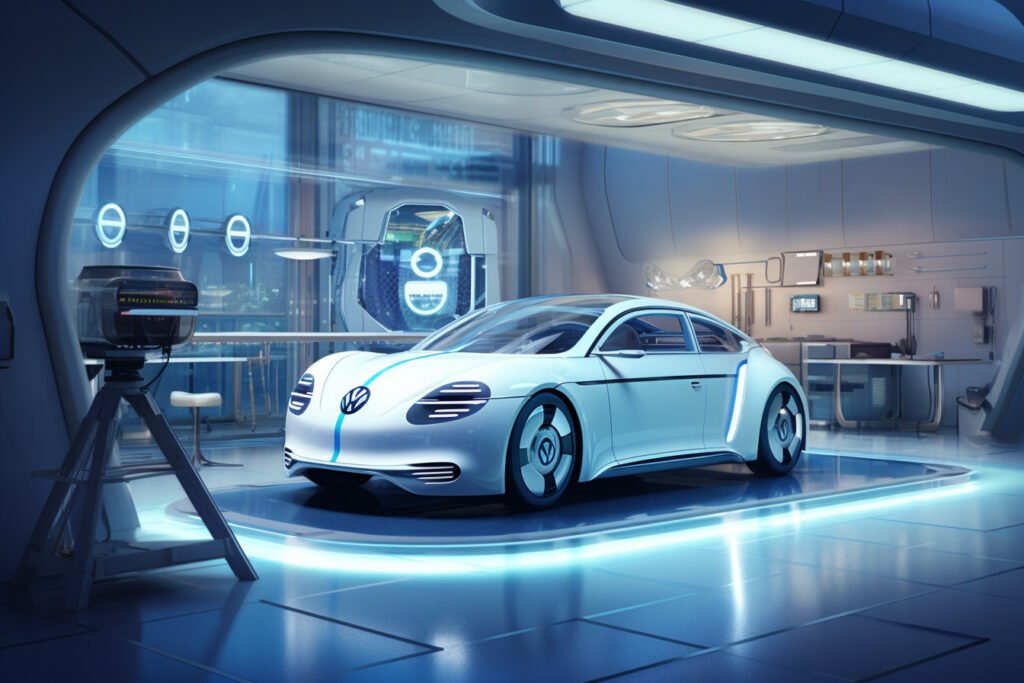Introduction: A Turning Point in Automotive Technology
The global automobile industry is undergoing a massive transformation, and Volkswagen is leading the charge with one of the boldest technology investments of the decade. The German automotive giant announced its intention to invest up to €1 billion in artificial intelligence (AI) by the end of 2030. This strategic move aims to enhance operational efficiency, accelerate innovation, and secure its competitive edge in the fast-evolving electric and autonomous vehicle market.
With advancements in machine learning, cloud computing, and autonomous systems, AI is no longer a futuristic luxury—it’s an operational necessity. Volkswagen’s investment signals its readiness to harness cutting-edge technology to redefine mobility, reduce costs, and improve customer experiences across the globe.
Why AI Is Volkswagen’s Future
Addressing Industry Challenges
The automotive sector is facing unprecedented challenges—from supply chain disruptions and rising costs to increasing competition from tech-driven startups and established global players. AI-driven solutions offer scalable and efficient alternatives, providing real-time analytics, predictive maintenance, and enhanced customer service.
Volkswagen’s decision to invest heavily in AI underscores its commitment to overcoming these challenges while embracing innovation as a pillar of growth.
Beyond Traditional Manufacturing
Volkswagen’s approach to AI isn’t limited to automation—it’s about transforming every aspect of the business:
- Vehicle Design: AI-powered simulations can speed up prototype testing, ensuring faster iteration and reduced time to market.
- Quality Control: Predictive maintenance algorithms can identify faults before they occur, reducing downtime and boosting vehicle reliability.
- Customer Experience: AI-enhanced interfaces can personalize services, from navigation assistance to customer support.
What Volkswagen Plans to Achieve
€4 Billion in Savings by 2035
Volkswagen projects that its AI integration will lead to savings of up to €4 billion by 2035, making the investment not only innovative but economically strategic. These savings are expected from operational efficiencies, optimized workflows, and reduced manufacturing defects.
Smart Factory Solutions
In partnership with Amazon Web Services (AWS), Volkswagen is expanding its “Factory Cloud” initiative—a digital platform that integrates AI tools into vehicle assembly and manufacturing lines. This expansion, covering over 40 sites worldwide, will empower engineers to track processes, reduce waste, and improve safety standards.
Empowering AI-Driven Teams
Volkswagen’s AI strategy emphasizes collaboration between humans and technology. By training employees to work alongside AI tools, the company aims to create a balanced workforce that leverages automation while preserving human expertise.
Real-World Applications: Where AI Is Already Making an Impact
The ID.CROSS Electric SUV
The unveiling of Volkswagen’s electric compact SUV, ID.CROSS, showcases AI-driven innovation at its finest. From aerodynamic design optimizations to predictive maintenance alerts and energy efficiency monitoring, AI integration is a core part of the vehicle’s experience.
Data-Driven Customer Insights
AI tools are also being used to analyze customer preferences and driving patterns. By understanding usage trends, Volkswagen can offer tailored solutions like energy-saving routes or personalized driving tips, enhancing both customer satisfaction and vehicle longevity.
Intelligent Supply Chain Management
AI algorithms help predict parts shortages, optimize logistics, and prevent delays. With global supply chains under pressure, these tools ensure smoother operations and faster delivery times.
Challenges and Ethical Considerations
While the investment brings promising benefits, it also raises important questions:
- Data Privacy: How will Volkswagen ensure customer data is protected while leveraging AI-driven analytics?
- Workforce Impact: How will AI integration affect jobs, and how will the company support reskilling efforts?
- Transparency: What frameworks are in place to ensure AI decisions are fair and unbiased?
Volkswagen has stated that ethical AI practices will guide its implementations, and employee retraining programs are already in development.
Looking Forward: The Road Ahead
Volkswagen’s AI investment marks a defining moment in the company’s transition from traditional automobile manufacturing to a tech-powered mobility provider. With AI shaping every stage of its operations, Volkswagen is setting a benchmark for others in the industry.
The company’s goal isn’t just about reducing costs—it’s about creating a smarter, safer, and more customer-centric experience that benefits both businesses and consumers alike.
Frequently Asked Questions (FAQs)
Q1: Why is Volkswagen investing in AI now?
A1: The automotive industry is facing increased competition, rising costs, and a shift toward electric and autonomous vehicles. AI offers solutions to streamline operations, improve efficiency, and enhance customer experiences.
Q2: How much is Volkswagen planning to invest?
A2: Volkswagen plans to invest up to €1 billion in AI initiatives by 2030, with expected savings of up to €4 billion by 2035.
Q3: Will AI replace human workers?
A3: Volkswagen aims to integrate AI tools to assist employees, not replace them. Training and reskilling programs are in place to ensure that workers adapt to new technologies.
Q4: How will customer data be protected?
A4: Volkswagen has committed to following strict data privacy protocols and ethical guidelines while leveraging AI-driven analytics.
Q5: What kind of AI technologies are being used?
A5: Volkswagen’s AI strategy includes machine learning, predictive analytics, natural language processing (NLP), and cloud computing powered by AWS.
Conclusion
Volkswagen’s commitment to investing €1 billion in AI is a bold and transformative step toward shaping the future of mobility. With applications across manufacturing, customer experience, and vehicle design, this investment is set to redefine how cars are built and experienced.
As AI continues to reshape industries, Volkswagen’s vision offers a glimpse into a future where technology and human expertise work hand in hand, driving efficiency, sustainability, and innovation.
For industry watchers, employees, and customers alike, this marks an exciting time in automotive history—and the road ahead is powered by intelligence.
Also Read: AI vs Human Learning: Can Artificial Intelligence Really Replace Teachers?



